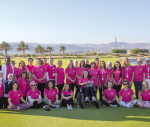You are here
Arab Americans demand respect
Apr 26,2021 - Last updated at Apr 26,2021
This is Arab American Heritage Month and we are delighted that it has been celebrated by the State Department, dozens of state and local governments, and the Democratic Party. It is a recognition we’ve long sought and deserve, precisely because Arab Americans have been plagued by a range of hostile behaviours: outright discrimination, maligning or denying our identity, political exclusion or silencing our voices. All had painful consequences but were all too often dismissed because they weren’t acknowledged as bigotry.
This manifested itself in a variety of forms. We were denied employment or excluded from coalitions because we were Arabs. Candidates returned our contributions or rejected our endorsements. Our heritage was denigrated by Hollywood and other forms of popular culture. Worse still, our cultural products were misappropriated and termed Israeli or Middle Eastern — but never Arab.
Personal examples abound.
In 1973, I was hired by a college, but was told I could only teach courses in religion. Anything to do with the Middle East was off limits because they said, “It would be controversial to have a person of your background in that role.” When I applied to teach at another college, I was told that my being an Arab might be helpful in getting some funding for the school. In either case, it wasn’t my qualifications that mattered, it was my ethnicity.
In 1978, on Halloween, at my children’s grade school, some classmates dressed as “Arabs” carrying bags of money or toy guns. When I asked the principal to speak to the children’s parents about how hurtful this had been, she declined.
Then in 1984, the late senator Alan Cranston, on finding out that I was of Arab descent, asked with a nervous chuckle, “What kind of crazy Ay-rab are you?” His comment came at the end of a meeting he was having with Jesse Jackson during which he pressed Jackson to make amends to the Jewish community for insulting language he had been reported to have made. Apparently, Cranston didn’t think Arabs were deserving of the same concern.
That same year, I did an exhaustive study of portrayals of Arabs and Arab Americans on American network television. I found no Arab Americans and the only portrayal of Arabs were terrorists or greedy suspicious oil sheikhs. When I met with the vice president for programming at one network and told him how hurtful this was for our children, his was response was, “Everyone has a complaint. The potato folks were here last week upset that we had a character on one of our shows claiming that potatoes are fattening.” I couldn’t make him understand that we were people, not potatoes.
While our heritage and ethnicity were vilified, our cultural products were misappropriated, adding insult to injury. We were denounced as being overly sensitive when we protested The New York Times promoting potato kibbee as Israeli, or Rachel Ray calling tabouli, hummus, and baba ghanoug Israeli cuisine. In the language of the day, we weren’t being overly sensitive, we were objecting to being cancelled.
In other instances, the discrimination had a more pernicious intent. When Arab Americans were first becoming organised, respected major Jewish organizations denounced our efforts. One withdrew from a pan-ethnic committee on media stereotyping, saying to the organisers that our presence on the committee was problematic. Another group wrote that “Arab American” was a fiction. We weren’t an ethnic community. Instead, they said we were Lebanese, Syrian, Palestinians, etc., who, as a result of petro-dollar funding, had formed an “anti-Israel Arab Lobby”.
In 1983 we were invited to serve in the leadership of the committee to celebrate the 20th anniversary of Martin Luther King’s March on Washington, Jewish groups threatened to withdraw unless the invitation was rescinded. They charged that our community, had not been a part of the civil rights movement — which was patently untrue and hurtful — and our only purpose was use the platform of the event to denounce Israel. They sought to define us and would not accept us as an ethnic community.
As a result of this mischaracterisation of our ethnicity, we have long been plagued by instances of painful exclusion. After attending a fundraiser with Arab Americans and American Jews, a candidate for mayor in Philadelphia was attacked by his opponent for “going soft on Arabs”. Instead of living up to his promise to be “the mayor for all Philadelphians,” he returned the contributions — only to those made by Arab Americans. In the years that followed, a number of other candidates did the same.
Because my community organised, fought back and won many allies, we have overcome many of these obstacles, but others remain. We now participate in politics and claim our ethnicity and heritage with pride. But the same bigotry rears its ugly head when we advocate for Palestinian rights. We are denounced as anti-Semitic when we call out Israeli policies as inhumane. This too is a form of discrimination. We are silenced and denied our full rights because we care about Palestinians. At the same time, Palestinian humanity and their rights to life and liberty are also denied.
Beginning with the Bush Administration and continuing through the Obama years, we’ve been confronted with a new challenge to our right to define ourselves — the conflation of Arabs with Muslims and dividing our community on the basis of religion. This, too, is a form of erasure — since it denies us the right to define ourselves as an ethnic community.
When our heritage is defamed, when our culture or ethnicity are denied, when we are excluded because of our beliefs, or silenced because others don’t want our voices heard — it’s bigotry. And we must demand that it end. That’s why we celebrate Arab American Heritage Month. It affirms who we are — proud and accomplished Arab Americans who will not be denied our right to define ourselves.
The writer is president of the Washington-based Arab American Institute











